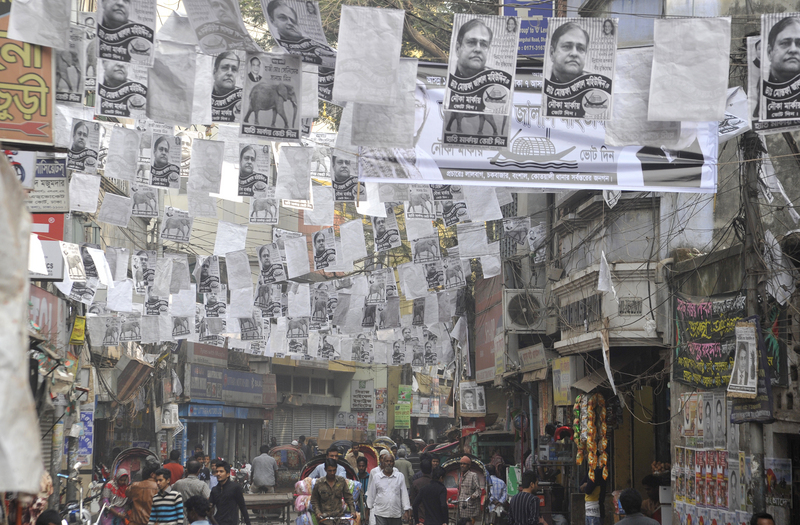
Dhaka is packed with thousands of posters as the candidates campaign for the 10th general election in Bangladesh on January 5, 2014. Photo by Naveed Ishtiyak © Copyright Demotix (28 Dec 2013)
When Bangladesh holds its general election on January 5, 2014 the ruling party and its allies are already sure to win more than half of the seats in parliament. This is a consequence of an opposition boycott led by the Bangladesh Nationalist Party (BNP).
But why are more than 25 political parties boycotting the election?
In countries with mature democracies, the governing parties don’t leave office during elections because everybody plays by the rules. But in Bangladesh, the tradition is to mistrust political leaders and expect that they will abuse power to rig votes. That's why the Bangladeshi constitution previously required a caretaker government to assume power during elections. However, in 2011 the parliament unilaterally abolished this system, allowing for general elections to be held under elected partisan governments.
The BNP led opposition had been demanding a caretaker government for the election since the passing of the 15th amendment to the constitution. Instead the government made a counter proposal to install an all-party interim government headed by the existing Prime Minister. The opposition refused. Since then, there have been a plethora of protests, including general strike, blockades, agitations, long marches etc.
Dr. Badiul Alam Majumdar, the editor of Suhshashoner Jonney Nagorik (Sujon), a civil society think tank, opined in an interview with the Daily Kaler Kantha [bn] why the opposition is not willing to make compromises:
বিরোধী দল মনে করে, এ রকম হলে তারা নির্বাচনে জিতবে না। তারা মনে করে, যদি নির্দলীয় সরকার নির্বাচনের সময় থাকে, তাহলে তারা ভোটে জিতবে। তারাও এখানে ছাড় দিতে চায় না, কারণ ছাড় দেওয়া মানেই ঝুঁকি নেওয়া। পরাজয়ের ঝুঁকি। বাংলাদেশের প্রেক্ষাপটে নির্বাচনে পরাজয়ের ঝুঁকি নেওয়ার কোনো অবকাশ নেই। এটাই হচ্ছে ক্ষমতার রাজনীতি।
The opposition thinks they will not win the election if it is held under the ruling party. They will only win if a neutral caretaker government runs the election. They do not want to be lenient, because they know if they are flexible, they are more exposed to the risk. The risk is losing the election. There is no option in Bangladesh politics to accept defeat. This is power politics.
On October 25, the day the election commission declared the schedule for the elections, the opposition, led by BNP and Bangladesh Jamaat-e-Islami, immediately refused it. They started their infinite strikes and blockade programs that crippled the country.
Violent protests
The protests to postpone elections and to establish a neutral caretaker government by the main opposition parties have led to violent protests and the deaths of 111 people [bn] in the past month alone.
A report by Human rights organization Ain O Shalish Kendra (ASK) says that violent political clashes in 2013 left 507 people dead, including 15 members of the police and two of the Border Guard Battelion, and 22,407 people injured (See Global Voices report).
Partha Sarathi Dey Tweets to the opposition leader:
বছরের শেষ দিন, এই বছর শেষবারের মত বলি, মোহতারেমা, নাশকতার রাস্তা ছেড়ে দিন। কিছু জঙ্গী জামাত শিবিরের সন্ত্রাসীদের… http://t.co/ct2WDVC8r8
— Partha Sarathi Dey (@parthabgd) December 31, 2013
Today is the last day of the year. Begging you Ma'm for the last time, please leave the road of violence… Except for some Jamaat-Shibir extremists you are alone. Please be mindful about the development of the nation.
There have been many international attempts to mediate between the feuding parties. The United Nations General Secretary Ban Ki Moon sent a letter to both the Prime Minister and the leader of the opposition urging them to meet and negotiate. He also sent a special envoy to Bangladesh. Many ambassadors and members of civil society have tried to mediate. But all efforts have failed due to the rigid stance by both leaders. This is why the country now heads for an opposition-less election.







2 comments